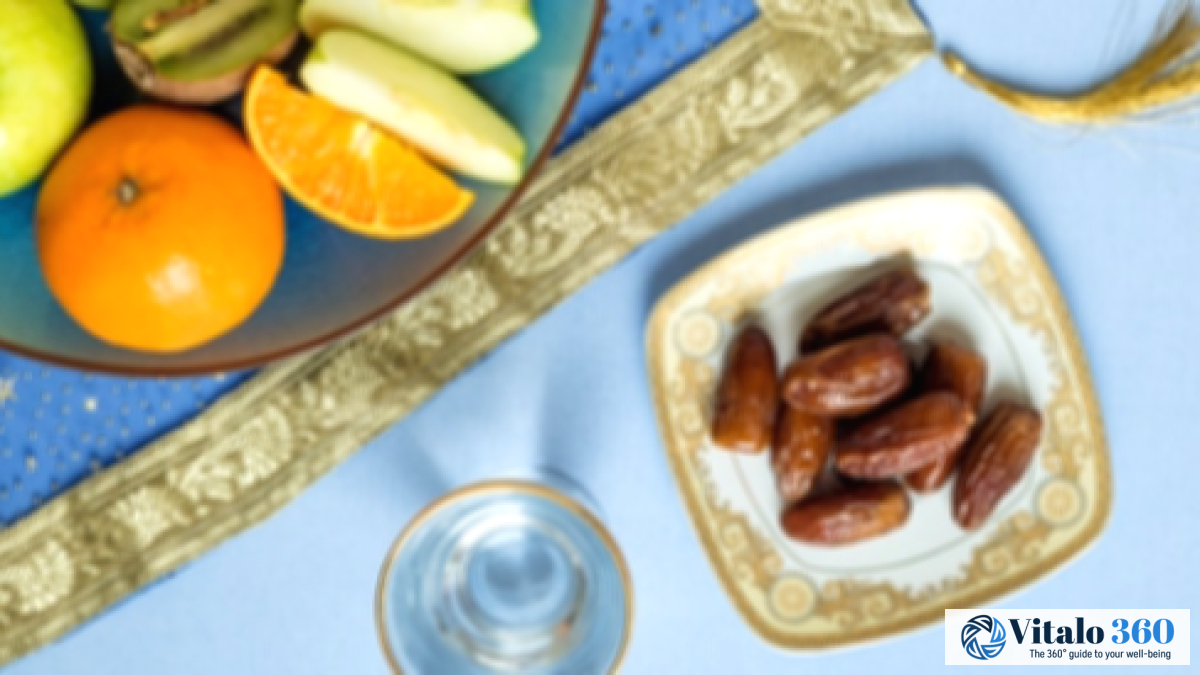.
Okay, so you’re probably thinking about how to stay hydrated during Ramadan, right? It’s a long stretch between suhoor and iftar, and keeping those energy levels up can feel like a real challenge.
Don’t worry we’re going to explore which fruits can give you that extra boost of hydration to keep you feeling good all day long.
- Top Fruits for Hydration During Ramadan
- Watermelon
- Strawberry
- Mango
- Figs
- Cucumber
- Banana
- Cantaloupe
- Grapes
- What are the benefits of fruits during Ramadan?
That said, we’ll get into the specifics, so you can make the best choices for your suhoor and iftar meals.
Top Fruits for Hydration During Ramadan
Choosing the right mix of foods, especially those packed with fluids and nutrients, is crucial. Snacking on the right fruits after iftar or during suhoor is a super smart way to boost hydration, keep you feeling full, and dodge those hunger pangs and dehydration symptoms while you’re fasting. The awesome thing is, there are loads of different fruits to pick from!
What are the best fruits to help you stay hydrated in Ramadan? Let’s dive in:
1. Watermelon
Watermelon is, like, one of the go-to fruits when you’re trying to stay hydrated, especially during Ramadan. Chowing down on some juicy watermelon between iftar and suhoor can seriously help keep dehydration at bay during those long fasting days. Why? Because it’s made up of about 92% water, making it a total hydration powerhouse.
Plus, watermelon’s got fiber, which helps with:
- Keeping things moving smoothly in your digestive system.
- Boosting your gut health and overall function.
- Helping you avoid constipation.
2. Strawberry
Strawberries are another fab choice for keeping hydrated during Ramadan. I mean, who doesn’t love a good strawberry? They’re made of about 90% water, which is pretty amazing.
But that’s not all! Strawberries are also packed with goodness that can help your body out. They can:
- Help flush out extra salts, thanks to being about 30% potassium.
- Boost your digestive health because they’re full of fiber and water.
3. Mango
Mangoes are another popular pick during Ramadan. They’re loaded with fiber and vitamins, giving you a fab nutritional boost. They pack around 135 calories and, the best part, mangoes can help:
- Keep cholesterol levels in check, which reduces your risk of heart problems.
- Regulate your blood sugar.
4. Figs
Figs are beneficial for your body. They’re an ideal choice for Ramadan because they help combat thirst. Why?
- They soften stool, improve bowel movements, and prevent constipation, thanks to their rich fiber content.
- They help lower blood pressure.
- They ease bloating.
- They give you the energy you need to tackle your daily activities.
5. Cucumber
Cucumbers are high in water content, making them excellent for staying hydrated. They contain about 89% water, so they’re a great choice for keeping you refreshed. They’re right up there with watermelon when it comes to keeping your body hydrated and balanced.
Cucumbers also offer benefits, they can help with:
- Preventing bloating, thanks to their electrolytes and essential minerals.
- Maintaining steady blood sugar.
- Boosting energy levels.
6. Banana
Bananas are a great choice for staying hydrated during Ramadan, and they help reduce feelings of thirst during those long fasting hours.
Plus, bananas help reduce cramps and prevent salt and fluid loss. They contain tryptophan, which your body converts into serotonin, a hormone that boosts mood and eases tension during Ramadan. Who doesn’t love a mood booster when you’re fasting?
7. Cantaloupe
Cantaloupe contains about 87% water. Cantaloupe is a solid choice for keeping you hydrated during those fasting days. Plus, it’s packed with vitamin C, which is great for fighting off illnesses. Enjoying cantaloupe as a juice or cutting it up into small pieces is a refreshing way to enjoy it.
8. Grapes
Grapes are awesome for hydration during Ramadan, boasting a high water content. They’re also packed with minerals and loads of antioxidants, which play a big role in lowering cholesterol levels.
So, if you’re reaching for grapes during Ramadan, you’re helping to dodge dehydration, ease digestion, and reduce constipation, not to mention, you’ll feel way more energetic.
I’ve been experimenting with different fruit combinations in my suhoor smoothie, and it’s been a game-changer. I feel more energized and less thirsty throughout the day. Plus, it’s a delicious way to start the fast!
Speaking of delicious ways to stay hydrated… How about some flavored water infusions? Throw in some slices of cucumber, lemon, and mint, and let it sit in your water overnight. It’s a super refreshing way to keep sipping throughout the night between iftar and suhoor! You can also experiment with berries, oranges, or even ginger for a little zing. It’s all about finding what you enjoy so you’re more likely to drink enough fluids.
What are the benefits of fruits during Ramadan?
So, we’ve chatted about some of the best fruits to keep you hydrated during Ramadan, but honestly, all fruits can be super beneficial for your body during this time. Let’s look at some perks:
- Giving your body a boost of hydration, energy, and vitality. They can also help beat those feelings of thirst and fatigue. Plus, they replenish lost fluids, vitamins, and minerals, which is super helpful during those long fasting hours.
- Keeping your blood sugar steady. Fruits have natural sugars, which is a great alternative for folks watching their sugar intake.
- Preventing constipation. Fasting can sometimes mess with your digestion, but snacking on fruits at iftar can help keep things regular since they contain fiber, which helps ease digestion.
- Shielding your body with antioxidants, which protect against cell damage. It is a smart move to include in your suhoor meal.
Key takeaways
- Staying hydrated during Ramadan is crucial, and fruits are an excellent way to achieve this due to their high water content and essential nutrients.
- Fruits like watermelon, strawberries, and cucumbers are particularly effective in maintaining hydration levels throughout the day.
- Incorporating a variety of fruits into your suhoor and iftar meals can provide sustained energy, prevent constipation, and offer vital vitamins and minerals.
FAQ, Myth & Facts
Can I eat any fruit during Ramadan?
Sure, almost all fruits offer nutritional benefits and contribute to hydration. However, fruits with high water content, like watermelon and strawberries, are particularly beneficial for staying hydrated during fasting hours.
Will eating fruits prevent thirst during the fast?
Fruits can significantly reduce the sensation of thirst due to their high water content and electrolytes. Consuming them during suhoor and in the evening can help maintain fluid balance.
Are dried fruits as effective as fresh fruits for hydration?
While dried fruits offer concentrated nutrients and energy, they have less water content than fresh fruits. It’s best to prioritize fresh fruits for hydration, but dried fruits can be a convenient and nutritious snack in moderation.
Is it better to eat fruits whole or as juice?
Eating fruits whole is generally better because you also get the fiber, which aids digestion and helps regulate blood sugar. Juices, while hydrating, lack this fiber and can cause a quicker spike in blood sugar.
During my first Ramadan after converting, I was really struggling with dehydration. A friend suggested I focus on eating more fruits, especially watermelon and cucumbers, during suhoor and iftar. It made a huge difference! I felt so much more energized and less thirsty throughout the day. It was a game-changer, and I’ve stuck with it every year since.
I used to think that drinking lots of water was enough to stay hydrated during Ramadan, but I always felt so drained. Then, I read about the importance of electrolytes and how fruits can help replenish them. Now, I make sure to include a variety of fruits like bananas, grapes, and oranges in my diet, and it’s helped me feel so much better. Plus, it’s a delicious way to stay healthy during the fast!
As someone with diabetes, I was always worried about how fasting would affect my blood sugar levels. But incorporating fruits like strawberries and mangoes in moderation has been incredibly helpful. They provide natural sweetness and fiber, which helps regulate my blood sugar and keeps me feeling full and energized throughout the day. It’s all about finding the right balance and listening to my body.
For me, understanding the benefits of these fruits wasn’t just about knowing what to eat, it was about changing how I approached my meals. From now on, it’s about intentionally including these hydrating fruits in my diet, understanding that it’s not just about surviving the fast, but thriving during it.










